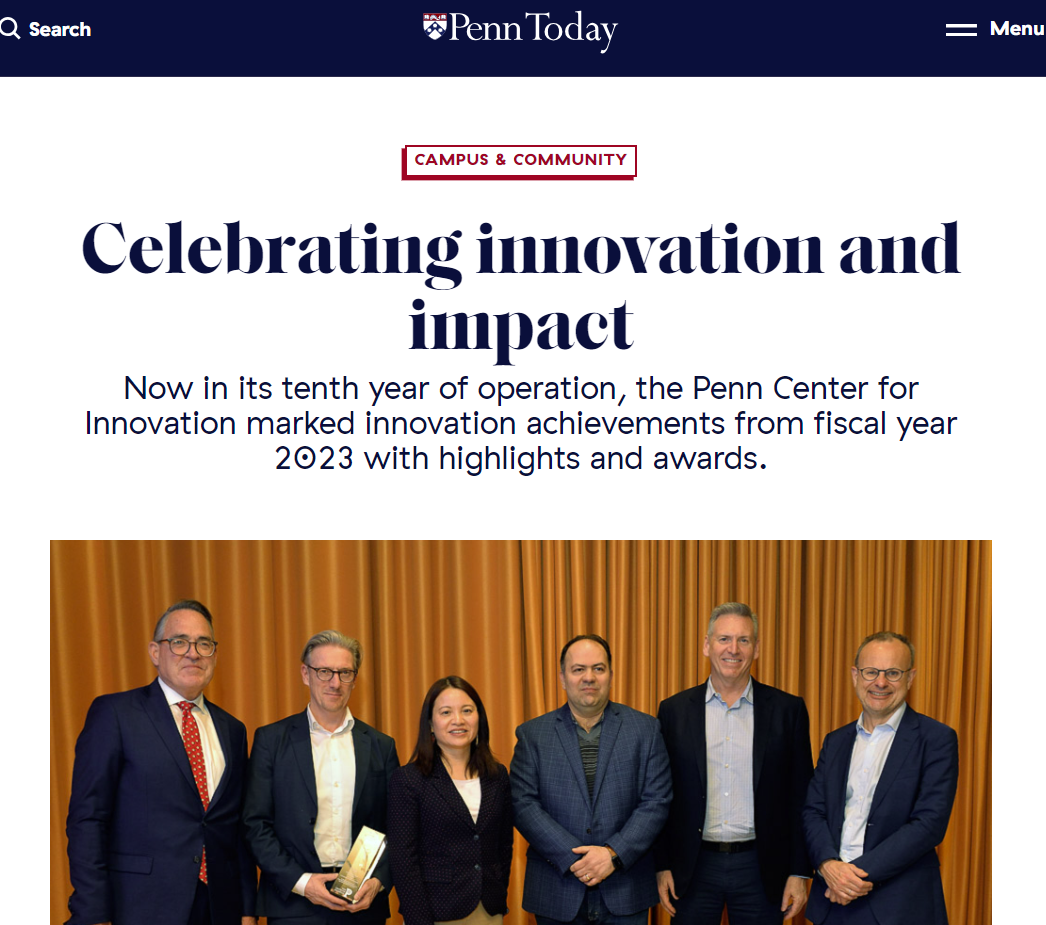During the 2024 fiscal year, there were 111 press mentions for PCI programs, startups and partners. Some of the most popular and widely circulated stories are listed below:
LNP Research from the Mitchell Lab is Highlighted in the Philadelphia Inquirer
Mike Mitchell, PhD, Associate Professor of Bioengineering at Penn Engineering, was interviewed recently by the Philadelphia Inquirer about his cutting-edge research in lipid nanoparticles (LNPs), which are crucial for delivering mRNA into the body’s cells.
LNPs, for example, were instrumental in the development of COVID-19 vaccines and are now being tailored by Mitchell and his research team to develop innovative treatments for cancer and other diseases.
In the interview, Mitchell explains how LNPs are made, how he is designing them to target different organs, and what steps he is taking to improve their efficiency.
Mitchell also notes that in a recent study, he and his team successfully delivered mRNA to the lungs of mice. The team achieved this by creating a library of LNPs composed of different lipids, and subsequently identified the formulation that selectively delivered its payload to the lungs. This type of organ targeting may also have applications in cancer treatment, where it may be advantageous to target the specific organ where the tumor resides, while avoiding the healthy organs.
Read the full interview with Mitchell to learn more about his research here.

Celebration of Innovation Featured in Penn News Today and Technical.ly
On December 5th, PCI hosted its annual Celebration of Innovation, where special awards were presented for exceptional commercialization accomplishments and to celebrate Penn researchers and innovators who were named as inventors on patents issued to Penn over the course of the past fiscal year.

2023 Nobel Prize in Physiology or Medicine awarded to Penn Medicine’s Karikó and Weissman
Katalin Karikó, PhD, adjunct professor of Neurosurgery, and Drew Weissman, MD, PhD, the Roberts Family Professor in Vaccine Research in Infectious Diseases, were named winners of the 2023 Nobel Prize in Physiology or Medicine. Their foundational research in the field of mRNA was vital to the development of the groundbreaking COVID-19 vaccines administered to billions globally, helping to lead the way out of the pandemic.
In recognition of the remarkable impact of their technology, The Nobel Foundation prize administrators reached out to Karikó and Weissman from Sweden in the early hours of October 2, 2023 to inform them of the news of their prestigious award. Since 1901, less than 1,000 people have received a Nobel Prize, and only 225 people have previously been awarded one in Physiology or Medicine. Further, Karikó is only the 61st woman to ever be named a Nobel Laureate. She is also the 13th woman to be awarded the Nobel Prize in Physiology or Medicine since 1901, and the first since 2015.
Read more about this extraordinary achievement and see the list of global articles about it here.

Carl June Receives 2024 Breakthrough Prize in Life Sciences
Carl June, MD, the Richard W. Vague Professor in Immunotherapy in the Perelman School of Medicine and director of the Center for Cellular Immunotherapies (CCI) at Penn Medicine’s Abramson Cancer Center, was named a winner of the 2024 Breakthrough Prize in Life Sciences.
June received the award in recognition of his development of chimeric antigen receptor (CAR) T cell immunotherapy, a novel cancer treatment approach where a patient’s T cells are modified to target and kill their cancer cells. Since June and his research team pioneered CAR T therapy at Penn thirteen years ago, it has been used to treat over 20,000 patients with leukemia and other blood cancers, with success rates from 50% to 90%.
“This award is not only a testament to Dr. June’s outstanding contributions to science, but also a shining example of the caliber of discoveries and research which Penn faculty set their sights upon,” said then Penn President Liz Magill in Penn Today. “We are immensely proud to have Dr. June as a member of the Penn academic community, and we know that CAR T cell therapy is just the first chapter in an inspiring and lifesaving new era of medicine.”
Read more about here:
- Penn Today
- Philadelphia Inquirer
- Forbes
- Penn Medicine News Release
- The Scientist
- The Guardian
- USA Today

Robotics Growth in Philadelphia Highlighted
The Philadelphia Business Journal published a feature on the growth of the robotics sector in Philadelphia, with an interview from Charlie Anderson, CEO of Burro, an emerging robotics company in the region.
Anderson told the Philadelphia Business Journal that he doesn’t just see opportunity for Burro’s own growth, but he sees promise across the entire emerging robotics scene in Philadelphia. He calls the city “one of the best places on the planet to build a robotics business today,” and references the local talent pool and a strong core of robotics startups that also includes Penn spinout Exyn Technologies. Read the full article here.
Penn’s Leadership Role in Philadelphia’s Rapidly Growing Life Sciences Industry Highlighted
Penn’s role in the development of Philadelphia as rapidly growing hub in the life sciences strong tech hub was highlighted in an article published by Technical.ly.
Sam Woods Thomas, senior director for business attraction and retention for the City of Philadelphia’s Department of Commerce, acknowledged that research institutions, including Penn, are the chief contributor to the industry’s local legacy. The achievement of several Penn faculty were also noted in the article, including Jean Bennett, MD, PhD, the F.M. Kirby Professor of Ophthalmology at Penn Medicine, Carl June, MD, the Richard W. Vague Professor in Immunotherapy in the Perelman School of Medicine and director of the Center for Cellular Immunotherapies (CCI) at Penn Medicine’s Abramson Cancer Center, and Albert Maguire MD, the F.M. Kirby Professor of Molecular Ophthalmology at Penn Medicine.
Thomas highlighted how the plurality of real estate options in Philadelphia in support of startup creation and growth: “The Philly region overall is well situated so that someone can start a company at Penn, go through the incubation and graduation stages in University City, and move to the manufacturing stage at the Navy Yard. Each of the stages a company goes through while growing requires a different type of real estate.” Read the article here.
Future mRNA Vaccine Applications Highlighted
The New York Post recently published an article discussing future applications of mRNA, including vaccines against tuberculosis, malaria, high cholesterol, and HIV, as well as cancer treatments, enzyme replacement therapies, immunotherapies, and more. Penn’s Dr. Katalin Karikó, co-inventor of the mRNA technology used in the COVID-19 vaccine, explains how mRNA vaccines serve as the “middleman between information and action” for prophylactic and therapeutic vaccine applications of the technology. Rather than injecting part of a virus into the patient as is more typical with a traditional vaccine approach, mRNA vaccines provide recipient cells with instructions on how to make necessary proteins or antibodies to help the patient’s immune system recognize and fight off infectious agents. Learn more about the future of mRNA by reading the article here.
Emily Whitehead, the First Pediatric Patient Treated with Penn-Invented CAR T Therapy, is Now a Freshman at Penn
Emily Whitehead, who was the first child to be treated with Penn-invented CAR T therapy eleven years ago, matriculated to Penn as a freshman in Fall 2023. From American Sign Language to English to Nature Photography, Emily has a wide range of interests she intends to explore in her studies. She also enjoys advocating for children with cancer and showing the world the type of fulfilling life that can follow a cancer diagnosis.
Learn more about Emily’s journey, from her medical treatment at CHOP to her university experience:
